So lately it seems like I’m just surrounded by baby talk. One of my sisters is pregnant, as is one of my cousins, my boyfriend’s sister, a classmate’s partner…. and now, suddenly, this very blog is joining in the chorus of constant baby babble. I mean, I love all you guys, but…

Does it feel like Myspace in here, or is it just me?
Since no one ever listens to my t-shirts, though, I guess I’ll join in as best I can. Babies… babies… ok, how about brood parasitism? That’s the parenting style that would suit me best.
Most people think of brood parasitism and two kinds of bird spring to mind: the cowbirds (most often the Brown-headed Cowbird) and the Old World cuckoos (most often the Common Cuckoo). But the honeyguides, indigobirds, and a single species of duck all do the classic cuckoo strategy (obligate interspecific brood parasitism) as well. And everyone always forgets about the brood parasitism that occurs closer to home: over 200 species of birds are known to occasionally indulge in a little intraspecific brood parasitism, that is, leaving an egg or two in the nest of another female/pair of the same species. This behavior is most common in colony nesters, since popping next door to drop off an egg is a lot easier than hunting down another nest through acres of forest or grassland.
It’s easy to see why some birds adopt this way of life. If someone else is doing the incubation and feeding, you can devote more energy to making eggs and staying alive yourself (or, in the case of intraspecific brood parasites, to your own optimally-sized clutch); if all your eggs are in different nests, they are literally not all in one basket and one disaster won’t wipe you out for the season; if you go the whole hog and don’t nest yourself, when your food source wanders away, you can wander with it instead of being tied down to a demanding brood.
In fact, it looks like so good a deal that I have to wonder why more birds don’t take that path. Perhaps it’s just too hard. Interspecific brood parasitism requires all sorts of specialized adaptations: carefully patterned eggs, robust and aggressive chicks, perfect timing. How do such things come to pass? It’s one of those fascinating bits of complex rigging that makes evolution just so darn fascinating. But the intraspecific kind? Piece of cake.
Despite the obvious upsides, people tend to hate on brood parasites, and the brood parasites that they hate are the interspecific kind – they barely even think about the rest. In the old days, this was par for the course. Measured by Victorian values, brood parasites are terrible people (ignoring the fact that they are not people at all) and their actions caused a fair amount of trouble for “cuter”, “nicer” birds. This last point is a bit legitimate when you look at their impacts on already-stressed species, but in the main, it was more of the kind of disorganized anthropomorphizing that leds to “nature lovers” hating on predators and neglecting the uncharismatic. Nowadays, folks at least recognize that the survival strategies of the honeyguides have no relevance to their own personal Freudian issues, but a visceral distaste often remains.
But come on. How could you hate a face like this?

The Barn Swallow is a common intraspecific brood parasite
Barn swallows via AudioImager.
•••
 Baby Bird Week is our celebration of the young, the cute, the adorable, the twee. We certainly spend enough time on adult birds here on 10,000 Birds so we figured it would only make sense to fawn over the fuzzy bundles of fluff that grow up to become the objects of our fascination. Whether you seek out waterfowl, songbirds, or seabirds we will have baby birds to match your obsession.
Baby Bird Week is our celebration of the young, the cute, the adorable, the twee. We certainly spend enough time on adult birds here on 10,000 Birds so we figured it would only make sense to fawn over the fuzzy bundles of fluff that grow up to become the objects of our fascination. Whether you seek out waterfowl, songbirds, or seabirds we will have baby birds to match your obsession.
Baby Bird Week will run from 15-21 July, Sunday until Saturday. Make sure to check back every day or even multiple times a day to keep up with all the baby bird goodness!
•••

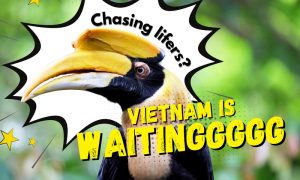


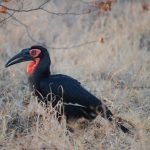
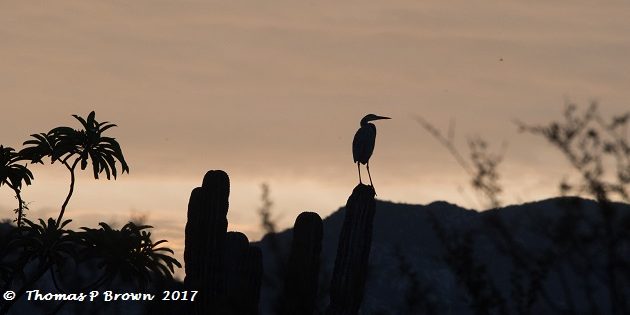
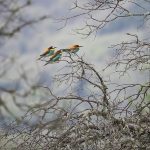
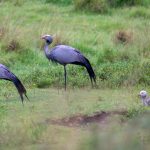
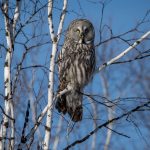


T-shirt by Kate Beaton?
I know someone who always interjects “Ugh!” whenever cowbirds are mentioned. I know cowbirds are implicated in the declines of some species, but brood parasitism is just one of many reproductive strategies. If it were really that destructive, the parasites would kill off their host species and likely die out themselves.
You are right. Us beat writers should suggest to our masters that we run a cleansing “natural selection” week soon.